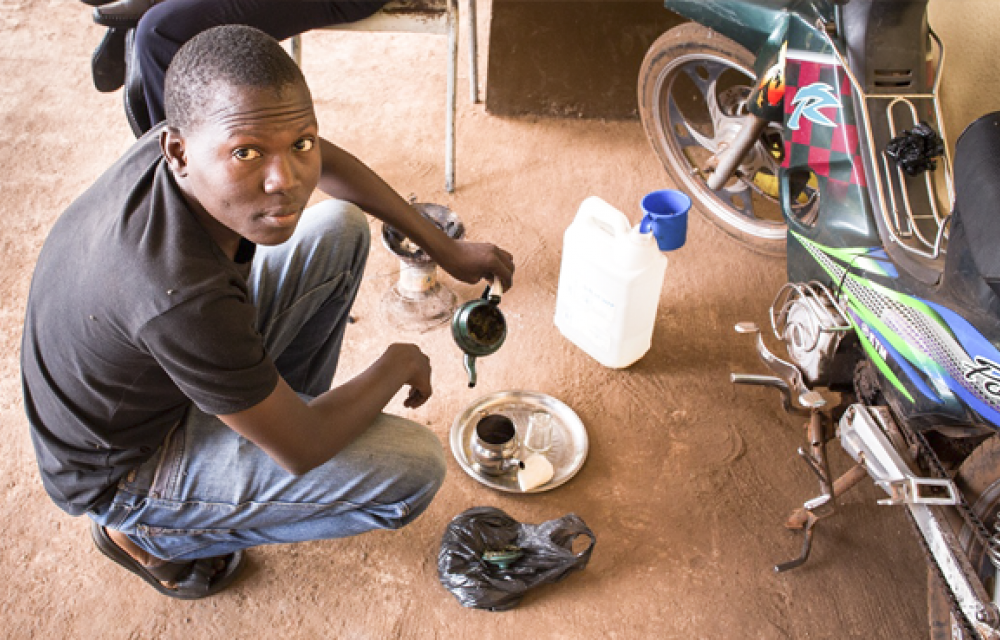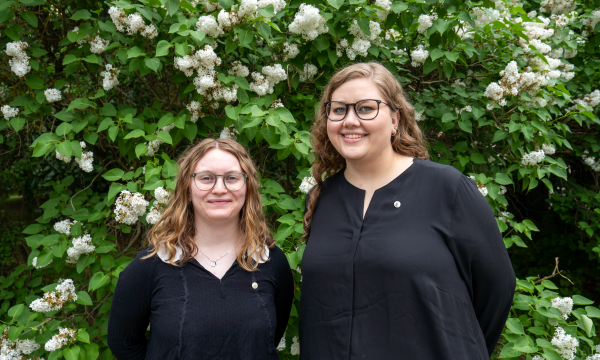
Even in wartime, the student grant is awaited
Winter is coming to an end and the temperature is rising with the sun. Some clothes hanging on a washing line, provide some shelter against the sun for Sidi Hamed Bicko, who is studying in the shade together with some friends. My interpreter and I show up for an unexpected visit and meet them in one of the campus areas of University of Bamako, which is set on an upland with a nice view over the city. Up here it is easy to forget that the state of emergency still prevails, after the last terror attack that hit the city.
No other military effort has cost as many UN-soldiers their lives as the one in Mali. The conflict has been going on since 2012 and is mostly located in the northern parts of the country, where different groups of rebels and jihadists keep on ravaging. Even Bamako, which is situated in the south, has been struck by three terrorist attacks during 2015. However, it does not seem to really bother Sidi and the other students. The day-to-day life progresses, and with that more pressing issues, like how to afford going to the lecture halls.
Sidi, like all the other students here, lives in a rectangular concrete building that stretches along the outskirts of the campus. Some departments can be found here on the mountain, but they are far away from everything. Even the lecture halls and the university library are located in a completely different part of the metropolis.
− It’s a problem for many people here. It’s both difficult and expensive to move around in the town – says Nianga Dembélé, who up until now, has been following the growing discussion in silence.
In order to get by as a student in Bamako, you have to have a moped, they establish collectively. Nianga mentions having spent 2500 CFA-francs – approximately 35 crowns – on bus fares every single week when he first arrived in Bamako. However, he managed to buy a moped with the help of his student grant, and in this way the transportation costs noticeably decreased.
The Malian state guarantees all of them a student grant that is divided into a price base amount of 35,000 CFA-francs – barely 500 crowns – as well as a grant that is based on academic results. A top student can get at least another 100,000 CFA-francs per year in a period of three years. The whole grant, and much more, would have therefore been spent on bus tickets for Nianga, if he had carried on taking the bus.
– The state has not administered any student grants in three months, though –Sidi observes, shrugging his shoulders with resignation.
So it is a good thing that living in the campus is still subsidised, as well as food.
– It’s very good indeed and we appreciate that. Though, it’s a pity that those who prepare food are in such a hurry that the meals are not properly cooked when they serve them, says Nianga.
There are a few who can support themselves only through the grant, regardless of their academic results. However, hardly anyone works alongside their studies. They cannot manage, as there are lectures and classes from early morning to evening, and moving around in the town also requires time. Many of them would not get by without the economic support they get from their families.
Cheick Ohmar Lanoga buys and sells second-hand student literature in diverse conditions right outside one of the dormitory entrances, where books are set out on the ground like a carpet. Through this side business, he gets some extra money while helping many others to access course literature, which is not always easy to find. The closest thing to a book shop that I found during my month in Bamako was Cheick’s book sale.
While we are talking, Cheick is preparing a pot of tea. His teapot is big enough to make only three small glasses. The preparation takes around half an hour, but the drinking process scarcely a half minute. Since I am a guest, I am offered the first glass; the second goes to my interpreter and the last goes to Sidi, being the oldest among the other students. After that, Cheick starts preparing a new pot and the conversation goes on.
A couple of days later, I have a beer together with English teacher George Yom. We sit in a small beer garden, which consists of three rickety plastic tables covered in red sand and dirt coming from the traffic that scurrys some meters from where we are. A completely normal beer garden in Bamako’s outskirts.
George was born in Togo, south of Mali, and he has worked in many West African countries. He is not very impressed that Mali’s government offers study allowances to its university students.
– Even Togo does that. It is actually not so uncommon in West Africa, he says, sipping his Malian beer.
He works for the International Institute of Management, a company that runs a number of private universities in West Africa including some in Mali. Right now he is working as an administrator and he is responsible for examining admission requests, CVs and study fees.
Apart from some minor fees, attending public schools and studying at Bamako’s public university is free. George and all the other students that I talked with, though, agree that the quality of the Universities is reflected in the amount you pay to study there. The public schools and the University of Bamako are therefore the cheapest ones, but they also appear to have the lowest quality. Those who can afford it attend other private schools and universities, among which the French one is highly esteemed.
– In the evenings, I give extra courses for university students who study English at the University of Bamako. Many of them do not receive any kind of oral practice, so it s not unusual for me to meet students who are not able to pronounce a single sentence in English.
To study at the International Institute of Management in Bamako, you have to pay 400,000 CFA-francs for the first year of studies, but then the fee increases yearly, explains George. A three-year bachelor costs slightly more than 1,5 million CFA-francs. If you want to add two additional years and take a master course, you will have to pay 3,7 million CFA-francs, which is approximately 50,000 crowns. An enormous amount of money for a majority of the Malians.
– It may sound like a lot of money, but there are also other more expensive institutions. I know of a private university where students have to pay two and a half million West African francs for a single year of studies.
What George Yom thinks the University of Bamako is lacking first and foremost is possibility for the students to specialise in a subject.
– I took my exam in Lomé, the capital city of Togo. If you want to specialise in British literature, you will have to study British culture too. This kind of specialisation is missing in Mali. How can Malian students compete with the surrounding world without some kind of front edge competence? Someone who tries to succeed at everything will end up failing in everything.
According to the UN s Human Development Index, HDI, which takes into account a number of different factors such as health, education and equality, Mali ranks lower than Afghanistan. In 2015, a third of Mali s adult population were illiterate and almost 40 percent drop out of public school. This happens despite the fact that a third of the country s budget is assigned to education. One explanation could be deduced from the fact that Mali is twice as big as France and large areas of the country s northern regions, which are still devastated by conflicts, are part of the Sahara desert, where there is a lack of educational facilities. Not the best circumstances to create an effective education system, George admits.
While Sidi talks about life as a student, the toothpick in his mouth is jolting faster by the minute. He gets more and more indignant and he is not the only one in the constantly growing group. I ask them to mention something that they view as positive about studying in Bamako, besides the student grant. Sidi s toothpick stops moving and the group becomes silent. But then Nianga begins to speak:
– Many of those who study, like myself, come from the countryside or from other African countries. The university is accessible for us all, but it can be hard to be a newbie here. This is why we look after each other as students. We share food, we loan each other s books and we stick together. This is how we do it in Mali.
All the students nod in agreement. After that, I am offered another cup of tea.
nbsp;
nbsp;
Mali’s student life in numbers nbsp;At the time of writing, 1,000 CFA-francs correspond to 14.21 Swedish crowns.
100,000 CFA-francs: this is how much a top student can get as a study grant from the government every year, for a period of three years. In addition to that, everyone also gets a basic amount of 35,000 CFA-francs per year. In total, a Malian top student hardly gets 2,000 crowns a year.
A student room in the campus area for a period of one year costs 10,000 CFA-francs.
A simple lunch from a street booth nbsp; - for example, fried cow pieces - costs around 500 CFA-francs.
A yearly access to the public library costs 2,000 CFA-francs.
Surfing for an hour in a Internet café costs 400 CFA-francs.
Studying at the International Institute of Mali nbsp;
nbsp;Bachelor: first year, 400,000; second year 450,000; third year 650,000. Total:1,5 million CFA-francs.
Master: same amount as a bachelor plus a cost of 900,000 for the fourth year and 1,300,000 CFA-francs for the fifth. Total: 3,7 million CFA-francs, slightly more than 52,000 crowns.
nbsp;












